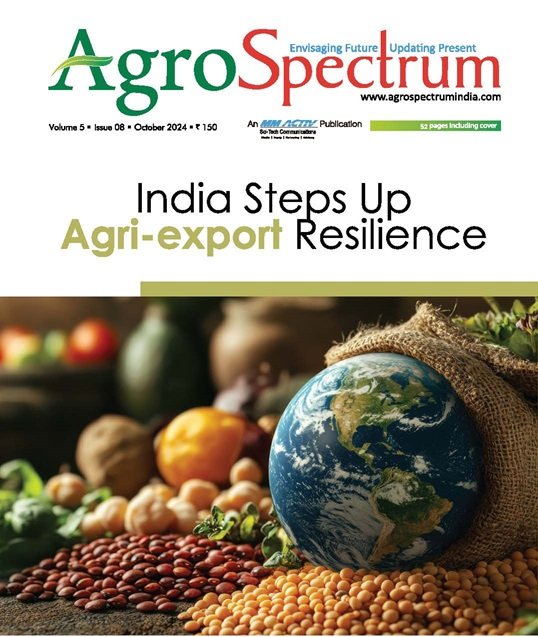India Steps Up AGRI-EXPORT Resilience
India’s agricultural exports touched $48.9 billion in 2023-24, registering an 8 per cent decline from $53.2 billion in 2022-23. The drop in agricultural exports was mainly due to the export ban on wheat, rice, sugar and onions. Meanwhile, out of 24 principal commodities of the Agricultural and Processed Food Products Export Development Authority (APEDA) 17 have recorded positive growth during the period, which included fresh fruit, buffalo meat, processed vegetables, basmati rice and banana. APEDA contributes a significant 51 per cent of agri-exports. From its modest beginnings with annual exports of $0.6 billion in 1987-88, proactive interventions by the APEDA have taken agricultural exports to a remarkable figure of $26.7 billion in 2022-23. This journey of exponential growth is underscored by expanding the export basket to over 200 countries, showcasing a commendable Compound Annual Growth Rate (CAGR) of 12 per cent. To further increase India’s share in agri export in the global market, the government has identified 20 farm products whose global imports are over $405 billion for a focussed push in the coming years. The strategy entails an action plan for the next five years to capture 10 per cent of the world trade in the 20 shortlisted products. India can achieve this provided the government addresses the issues of the agriculture industry.
On September 14, 2024, in a significant step to boost the export of basmati rice, a premier GI variety of rice of India, the Government of India decided to remove the floor price on the export of basmati rice. This decision was taken in response to ongoing trade concerns and adequate domestic availability of rice. The APEDA will closely monitor export contracts to prevent any non-realistic pricing of basmati rice and ensure transparency in export practices.
It may be noted that, in August 2023, a floor price of $1,200 per metric tonne (MT) was introduced as a temporary measure in response to rising domestic rice prices in the wake of tight domestic supply situation of rice and to curb any possible misclassification of non-basmati rice as basmati rice during exports, given the export prohibition on non-basmati white rice. Following representations from trade bodies and stakeholders, the government then rationalised the floor price to $950 per MT in October 2023.
Besides, to boost exports of onions, the government has decided to remove the Minimum Export Price (MEP) on onions and reduce the export duty from 40 to 20 per cent. This will increase onion exports, resulting in a rise in income for onion-producing farmers. The government has also decided to remove the MEP on basmati rice, enabling basmati rice-producing farmers to export and earn higher profits. Sharing this on ‘X’ (formerly Twitter) on September 14, the Union Home Minister and Minister of Cooperation, Amit Shah, said that this will boost exports to ensure that farmers receive a fair price for their crops, allowing them to earn maximum value for their produce.
Hailing the government’s decision, Akshay Gupta, Head – Bulk Exports, KRBL Limited said, “We greatly welcome the government’s resolution to remove the MEP on basmati rice. The timing of this strategic move coincided favourably with the imminent harvest of the new crop. With the removal of MEP, Indian exporters now have the power to offer basmati rice at far more competitive rates on a global scale, seemingly primed to drive a huge surge in export volumes.”
He further said “With new crop sales and export orders set to be finalised, this decision provides greater clarity for importers worldwide regarding India’s policy direction. Moreover, this change is expected to benefit farmers by boosting income and price realisations, as increased demand in the short term is likely due to the competitive pricing from Indian exporters.”
Reacting to this announcement, Pankaj Khandelwal, President – Output business, AgroStar Group, said that the recent policy adjustments, such as removing the MEP on basmati rice and onions, will make Indian produce a lot more competitive in the global market and enable better price realisation for the farmer.
Khandelwal however maintained that India’s role as a major global food supplier continues to gain recognition, with its agricultural products being well-received in international markets. Consistent trade policies will enable global buyers to plan their supply chains more predictably, making India an attractive destination for sourcing fresh produce. For farmers, this consistency allows for better planning, as they can shift their focus toward growing export-quality crops, confident that there will be a reliable demand and fair pricing in global markets. In the medium term, it also encourages greater investment in supply chain capabilities across the value chain.
To read more click on : https://agrospectrumindia.com/e-magazine
India’s agricultural exports touched $48.9 billion in

